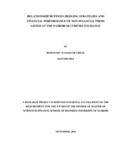Relationship Between Hedging Strategies And Financial Performance Of Non-Financial Firms Listed At The Nairobi Securities Exchange
| dc.contributor.author | Chege, Rosemary Wangechi | |
| dc.date.accessioned | 2017-01-09T12:42:16Z | |
| dc.date.available | 2017-01-09T12:42:16Z | |
| dc.date.issued | 2016 | |
| dc.identifier.uri | http://hdl.handle.net/11295/100000 | |
| dc.description.abstract | Risk management is an important component of financial management of organizations especially those involved in international trade because of their exposure to foreign currency price fluctuations. This follows high volatility in the foreign exchange market thereby creating uncertainty. Non –financial firms listed at the Nairobi Securities Exchange have faced various forex challenges following unstable exchange rates which saw the Kenyan currency depreciate against major currencies. The study sought to determine the relationship between hedging strategies and financial performance of non-financial firms listed at the Nairobi Securities Exchange. The study adopted a descriptive research design targeting 46 listed non-financial firms on the NSE. Data for the study was collected for a period of 5 years 2011-2015 using quarterly data. The findings of correlation analysis revealed that the Pearson correlation between return on Assets and lead and lag strategy of hedging indicates that strong positive correlation exists between financial performance (ROA) and the application of lead and lag hedging strategy among non-financial listed firms at the NSE. The findings of regression analysis indicated that forwards and currency invoicing were significant in explaining the variations in financial performance. The study concludes that a strong positive correlation exists between financial performance (ROA) and the application of lead and lag hedging strategy among non-financial listed firms at the NSE. The study further concludes that a strong positive correlation exists between currency invoicing and financial performance of non-financial firms listed at NSE. The study also concludes that forwards and currency invoicing were significant in explaining the variations in financial performance. The study recommends that the management of non financial firms listed at NSE should put in place currency invoicing strategies so as to minimize the risks of fluctuation in foreign exchange currencies. The study further recommends that non financial firms listed at NSE should actively pursue the led and lag strategies to enhance their financial performance. There is need for non financial firms listed at NSE to delay the payment of for imports from their customers at the same time press for early payment by the buyer. This will imply that the cash inflow from the export is used as cash outflow for imports. This will help non financial firms listed at NSE to escape devaluation risk in import payment and default risk in export receipt. Non financial firms listed at NSE should also embrace forward contract in hedging against currency and interest rate risks. Presence of forward contracts among non financial firms listed at NSE will ensure that their buyers are obligated to buy, and the non financial firms to sell a given asset at a predetermined price and date in the future. This contract will also ensure that no cash or assets are exchanged until expiry, or the delivery date of the contract. | en_US |
| dc.language.iso | en | en_US |
| dc.publisher | University Of Nairobi | en_US |
| dc.rights | Attribution-NonCommercial-NoDerivs 3.0 United States | * |
| dc.rights.uri | http://creativecommons.org/licenses/by-nc-nd/3.0/us/ | * |
| dc.title | Relationship Between Hedging Strategies And Financial Performance Of Non-Financial Firms Listed At The Nairobi Securities Exchange | en_US |
| dc.type | Thesis | en_US |



